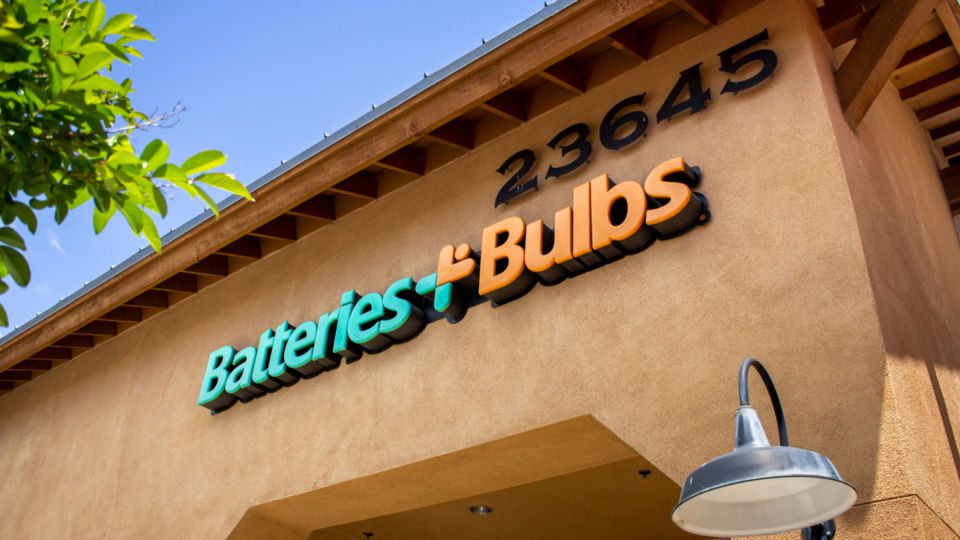Essential retailers are lucky to be open, but they still face a number of tough challenges during the COVID-19 pandemic. Not only must they keep their employees and customers safe; they also have to help shoppers adjust to new norms and potential points of friction. Batteries Plus Bulbs, which has been designated an essential retailer due to its role supplying batteries to both consumers and businesses like hospitals, has adjusted its operations to excel in this new reality.
“There’s been a shift in areas of behavior, and part is that is the home office,” said Scott Williams, CEO of Batteries Plus Bulbs in an interview with Retail TouchPoints. “There are people learning for the first time not only how to use a home office, but how to home school, so they’re both the teacher and the worker. The new reality is that they need laptop batteries, maybe more chargers, and our offerings around consumer electronics are becoming more important. There’s also lot of people that don’t have a landline now, so if you need a cell phone repair or a battery, that’s for your primary or sole source of contact.”
The retailer has managed to thrive in this environment: its Medallia net promoter score, an index rating shoppers’ willingness to recommend products to others, has reached a high of 84.5%. This success can be attributed to several factors:
- Speedy Operating Adjustments: Batteries Plus Bulbs shifted its buy online, pick up in-store (BOPIS) program into its primary form of contactless shopping in just 48 hours, while implementing safety measures to protect associates;
- Franchisee Communication: Most of the chain’s stores are franchised, and the home office has been working closely with store owners to guide them through the current challenges; and
- Staying Nimble: The lingering impact of coronavirus may weigh on retail operations for months after the pandemic ends, and Batteries Plus Bulbs is preparing for the future even as it handles the current crisis.
Going Contactless In A Hurry Requires Customer Education
A robust BOPIS program is an essential ingredient for limiting store traffic and maintaining social distancing, but even an established program may need some tweaking to maximize usage. Batteries Plus Bulbs already offered the service at its 730+ locations, and the retailer was able to quickly turn BOPIS from an optional convenience into a contactless shopping option.
“We had BOPIS already going, but the part I’m really proud of is, from the start of these announcements to shelter in place, we had contactless curbside up in 48 hours,” said Williams. “All it required our folks to do was to be more nimble with the program.”
Batteries Plus Bulbs already had sandwich boards and dedicated parking spaces where shoppers would normally have car batteries replaced free of charge, so the current rollout was a matter of education and refinement. Under current circumstances, shoppers who have placed an order can drive to the store, call and have their purchase brought directly to their car with no need to enter the shop.
Each location has commissioned new signage from local sign shops to help shoppers understand the procedure, while information regarding store hours, phone numbers and pickup procedures at each individual store is posted on both desktop and mobile web sites.
The stores are being cared for as well, with all products wiped down before they’re brought out to customers and masks and gloves available for associates who want them. The retailer also has implemented daily safety procedures designed to keep its workers healthy.
Communication Is Key — Particularly With Franchisees
About 650 Batteries Plus Bulbs locations are franchised, and this decentralized structure could present a significant challenge due to turbulent operating conditions. The company has been in close communication with store owners to help them manage the rapidly evolving situation and to keep well-stocked as supply chains become pressured — a practice Williams recommended to any other franchise-heavy retailers operating during the pandemic.
“Folks are very comfortable with running their businesses, but they’re seeing things that are unprecedented,” said Williams. “We spend a lot of our time picking up the phone and talking with them and saying, ‘Hey, this is going to be the benefit in a certain product category, this will be the challenge in a different product category.’ As we communicate, I think we both look around — and this is important for our franchise owners, which are small business owners — and think, well, it’s a tough time for America, but as long as I can figure out all these changes and sort through the news, I’m not in a bad place.”
This level of cooperation has helped the company continue expanding despite the pandemic, with plans for three new stores, including the first Batteries Plus Bulbs in Vermont, under way. Operating during COVID-19 presents an immensely difficult retail atmosphere, but the company’s success despite these troubles has made it attractive to new franchisees.
“As we work through this, [potential franchisees] see us able to remain open as an essential retailer and pivot to contactless,” said Williams. “The feeling was that, if you were to compare opportunities, it’s a comforting feeling to know that you’re coming into a franchise system that’s essential and that has 30% commercial business.”
COVID-19 May Herald A Contactless Future, But Tactile Experiences Will Be Important
While the pandemic will eventually end, its effects on retail may linger — particularly as more and more customers are exposed to contactless and omnichannel shopping options for the first time. Retailers need to think about what share of their customer base may shift over to these options permanently, and adjust their operations, workforce and forecasting accordingly.
“I think as a retailer you have to be smart about what ends up occurring,” said Williams. “Can you integrate a robust e-Commerce system with contactless and still have a breadth of offering, and still be able to show off the other things you have for sale? I think that’s going to cause retailers to be nimble and figure that out, but it also has some advantages for those who rethink staffing, planning and things like that.”
However, Williams also believes there may be a surge of traditional brick-and-mortar sales as shoppers rush back out into the world. People will have been cooped up in their homes for months, unable to feel or examine anything before they purchase it — and retailers ready to offer a tactile shopping experience will be the perfect outlet.
“I think people will have learned to do things a little bit more remotely and contactless, but having said that, I think it also reinforces the importance of retail in that people miss getting out,” said Williams. “People miss the interaction. People miss being able to see and touch and handle product, and I don’t think that totally goes away. In fact, I believe there may be a bit of pent-up demand after folks spend a couple of months away from others. They’ll want to go to parks and exercise and get out.”













